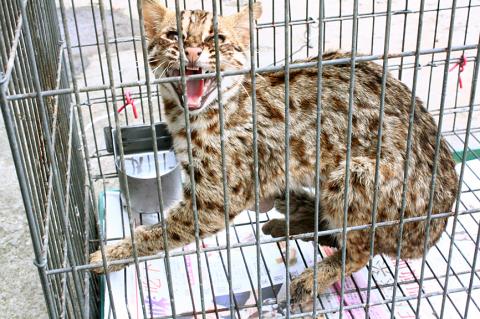A leopard cat found last month in Miaoli County’s Gongguan Township (公館) is recovering from injuries and dehydration, the Miaoli County Unique Animals Preservation Association said yesterday.
The leopard cat is an indigenous wild cat that is endangered and protected. According to research by National Pingtung University’s Institute of Wildlife Conservation, there are fewer than 1,000 in the country.
Called leopard cats because of their leopard-like spots, the animals are marked with twin white stripes across the forehead and are slightly larger than domestic cats, but have long thick tails and are nocturnal carnivores.

Photo: Ho Tsung-han, Taipei Times
The association said it found the leopard cat on Cianshan (淺山) in Gongguan with its right front leg caught in a trap. Association director Lin Ching-chi (林清棋) alerted the county’s Agriculture Department and sent the leopard cat to a veterinarian.
The mating season for leopard cats is from December to April, and the routes the cats take tend to follow the paths of their prey and are unpredictable, Lin said, adding that the leopard cat the association found could have been caught in the trap for as long as eight days.
There were maggots in its wounds and the cat was lucky that it rained recently or it would have died of dehydration, Lin said. After the veterinarian amputated the limb and injected the cat with nutrients, it gradually regained its health, he added.
Meanwhile, the county’s Agriculture Department yesterday reminded the public that if they found leopard cats preying on domestic animals, they should not attempt to capture or kill them, but contact the local fire station.
Capturing or selling leopard cats is against the Wildlife Conservation Act (野生動物保育法) and is punishable with a prison sentence of six months to five years, along with a fine of NT$200,000 to NT$1 million, the department said.
Translated by Jake Chung, Staff Writer

The Ministry of Economic Affairs has fined Taobao NT$1.2 million (US$36,912) for advertisements that exceed its approved business scope, requiring the Chinese e-commerce platform to make corrections in the first half of this year or its license may be revoked. Lawmakers have called for stricter enforcement of Chinese e-commerce platforms and measures to prevent China from laundering its goods through Taiwan in response to US President Donald Trump’s heavy tariffs on China. The Legislative Yuan’s Finance Committee met today to discuss policies to prevent China from dumping goods in Taiwan, inviting government agencies to report. Democratic Progressive Party Legislator Kuo Kuo-wen (郭國文) said

The Ministry of Economic Affairs has fined Taobao NT$1.2 million (US$36,900) for advertisements that exceeded its approved business scope and ordered the Chinese e-commerce platform to make corrections in the first half of this year or its license would be revoked. Lawmakers have called for stricter supervision of Chinese e-commerce platforms and more stringent measures to prevent China from laundering its goods through Taiwan as US President Donald Trump’s administration cracks down on origin laundering. The legislature’s Finance Committee yesterday met to discuss policies to prevent China from dumping goods in Taiwan, inviting government agencies to report on the matter. Democratic Progressive Party

Taiwan and its Pacific ally Tuvalu on Tuesday signed two accords aimed at facilitating bilateral cooperation on labor affairs, according to Taiwan’s Ministry of Foreign Affairs (MOFA). The governments inked two agreements in Taipei, witnessed by Foreign Minister Lin Chia-lung (林佳龍) and visiting Deputy Tuvaluan Prime Minister Panapasi Nelesone, MOFA said in a news release. According to MOFA, the agreements will facilitate cooperation on labor issues and allow the two sides to mutually recognize seafarers’ certificates and related training. Taiwan would also continue to collaborate with Tuvalu across various fields to promote economic prosperity as well as the well-being of their

Sung Chien-liang (宋建樑), who led efforts to recall Democratic Progressive Party (DPP) Legislator Lee Kun-cheng (李坤城), was released on bail of NT$80,000 today amid outcry over his decision to wear a Nazi armband to questioning the night before. Sung arrived at the New Taipei District Prosecutors’ Office for questioning in a recall petition forgery case last night wearing a red armband bearing a swastika, carrying a copy of Adolf Hitler’s Mein Kampf and giving a Nazi salute. Sung left the building at 1:15am without the armband and covering the book with his coat. Lee said today that this is a serious